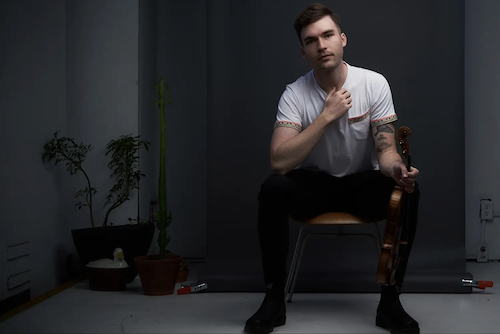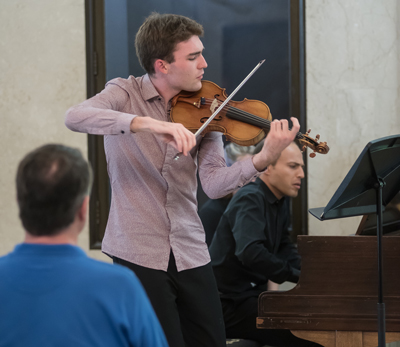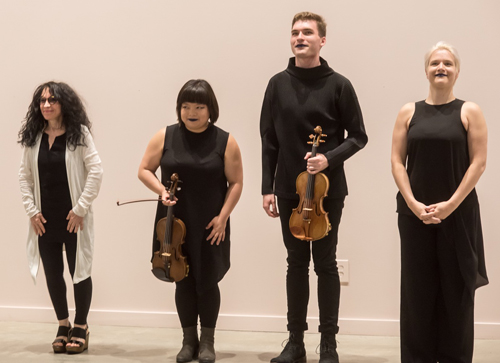by Mike Telin

Since then Alexi Kenney has established a career that is his own. He regularly creates experimental programs, commissions new works, solos with major orchestras around the world, and is a constant figure at renowned chamber music festivals. He is also the recipient of an Avery Fisher Career Grant and a Borletti-Buitoni Trust Award.
And this week Kenney will once again return to ChamberFest. I caught up with the violinist by telephone.
Mike Telin: You’ve been part of ChamberFest for a long time.
Alexi Kenney: Yes, my first summer was in 2015.
MT: I remember that year — especially your performance of the Strauss Sonata with Orion Weiss at the Downtown Library (pictured below).
AK: That’s right!
MT: It was a great performance. It was clear that you were destined to have a stellar career.
AK: Thank you. But it feels like it has been so organic. One thing has led to another, and all of a sudden it happened.
MT: Your first year you had the title of “Young Artist,” which evolved into the
“Rising Star” program. What did you learn from that experience?
AK: That year was one of the first times I had been to a professional summer chamber music festival. I remember being very excited, and part of that was because Diana [Cohen] had assembled such an incredible roster of musicians. It was also one of the first times I had been confronted with so many great players, playing in so many different combinations of them during the course of a week or two.
I was thankful and happy to be there surrounded by such great artists, and that feeling hasn’t changed at all. That’s the special part of Diana’s approach to bringing people together and to programming. She always goes at it from a point of who will bring the best artistry, and will seamlessly fit in with those incredible musicians, but who will also socially fit into this fabric of a festival that is as much about friendship as it is musicianship.
MT: You’ve also been invited to bring your own musical interests to the festival. For example your program that interweaved movements from Bach’s Sonatas with short modern works that included electronics. There was also Kurtág’s Kafka Fragments and last summer’s Ferdinand the Bull.
AK: I’m always interested in finding new ways of presenting old and new pieces, and Diana shares that thirst for newness well.
As we’re talking, I’ve realized how many opportunities I’ve had over the course of many years to showcase my own ideas and experiment within the Festival. It’s quite special and not every artistic director gives their artists that much trust.
MT: Are there any particular works you’re looking forward to playing this year?
AK: Fauré’s First Piano Quintet (June 24). It’s probably played less often than his other chamber works. But his piano quintets are a bit more — how should I say this — spacy. Almost stream of consciousness, and I find that world to be so appealing. This Quintet is like you’ve been thrust into outer space. It’s so otherworldly and I’m always instantly transported whenever I hear it. I’m very excited to play it — I have a couple of times and it’s always a joy.
I’m also looking forward to the Mozart Divertimento in E-Flat (June 23). I’ve never played it and it is difficult to program because it is incredibly long — 45 or 50 minutes. The divertimento was the Classical idea of having a piece that is not “serious” music. But the Mozart — or if you think of the Beethoven Septet or the Schubert Octet — those are huge, long-form divertimentos.
And this one is special in that the instrumentation is so lean. There are only three voices playing this epic, large-scale work. And that in itself is interesting for the audience. There’s no wasted moment, no wasted note, and at a certain point everyone has to take on all of the roles. So it is a conversation between three people. And Mozart goes to places you never knew were possible for a string trio to go. It all sounds so rich and complete.
MT: I know you just returned from a chamber music festival in Denver, and I noticed on your schedule that you have a number of them on your docket this summer.
AK: Yes, and it’s very nice to be busy again. I did catch COVID and had to cancel out of one thing that I was really looking forward to, but such is life these days. But thankfully I’m totally recovered.
MT: How did you spend your time when live and in-person concerts were not happening?
AK: For me, it was a 180-degree life change. I’m 28, and a lot of people in my generation experienced this: we had to move back in with our parents because we had no income to pay our expensive rents in New York City and elsewhere.
I took quite a few months off from playing — it just sort of happened that way. I’m from California so it was nice to be in a beautiful place. But it was difficult and I did not have a great time — we were all faced with so many existential questions. Musician lifestyles are not always the most healthy. We’re always traveling and trying to juggle time zones along with the stresses of preparing for the next thing. So for me, and for a lot of my colleagues, it’s caused us to think about what we truly want to be doing. I hope to never have to repeat that year.
MT: I also noticed that you have been playing the Sibelius a lot these days. Is that by design?
AK: Actually, it was almost completely by happenstance. I had a couple Sibelius Concertos scheduled during the pandemic that of course were canceled. And I had a few other concertos that were also canceled and had to be rescheduled.
So what happened was this: the two orchestras I was supposed to have played it with kept it, and then by some strange coincidence, the other orchestras decided to change their concertos to Sibelius. Then I ended up filling in for two European artists who had to cancel because of visa issues, and they were both playing Sibelius. So it just happened that I spent the entire spring playing it, which turned out to be one of the most interesting and rewarding experiences I’ve had.
I’ve never gone on a ten-date tour with orchestra playing the same piece. So for me, playing this complicated, complex, emotionally turbulent, and ethnically formidable piece that never quite gets easier was such a great experience. And to get to play it with different ensembles and conductors was a highlight.
MT: I hope you still like the concerto?
AK: Miraculously I kind of fell more and more in love with it. There’s no concerto that is written quite like it.
MT: Alexi, thanks so much for talking. Is there anything you’d like to add?
AK: Other than I can’t wait to be back at ChamberFest — I have the best hosts in the entire world in Cleveland and I’m excited to see them.
Published on ClevelandClassical.com June 21, 2022.
Click here for a printable copy of this article





